In the business world, a professional email address is nonnegotiable, no matter your industry. When you’re starting out, a generic email like yourname@gmail.com works just fine, but if you want to look professional to customers, investors, and everyone in between, you’ll need a professional business email address—one that represents your brand and is easy to remember.
The good news is that getting a business email address is easy. And, the best business email providers don’t just give you a professional email address; they also provide handy productivity tools like shared documents and spreadsheets, as well as cloud storage and advanced security. Most of all, they give you a custom domain, which is the hallmark of a reputable and trustworthy business your customers can count on.
Below, I’ve rounded up the nine services providing the best email for businesses, including the features that make them great, how much they cost, and who they’re best for.
- Google Workspace: Overall best email provider for small businesses
- Proton Mail: Best for advanced email security
- Microsoft 365: Best for advanced email and productivity tools
- IONOS: Best all-in-one email and website platform
- Hostinger: Best for agencies and resellers
- Zoho Mail: Best free business email platform
- DreamHost: Best for unlimited email addresses
- InMotion Hosting: Best for guaranteed uptime and a dedicated email address
- ScalaHosting: Best for daily email backups
Google Workspace smoothly integrates the business solutions your team needs to work anywhere on any device —all in one place. |

|
Best Business Email Providers at a Glance
Business Email Provider | Free Plan | Starting Cost Per Month | Starting Email Storage | Free Domain | Our Score |
|---|---|---|---|---|---|
✕ | $6 | 30GB | ✓ | 5/5 | |
✓ | $3.99 | 1GB | ✕ | 4.73/5 | |
✕ | $6 | 1TB | ✓ | 4.66/5 | |
✕ | $1 | ✓ | 4.64/5 | ||
✕ | $2.49 | 1GB | ✓ | 4.44/5 | |
 | ✓ | $1 | 5GB | ✕ | 4.40/5 |
✕ | $4.95 | 25GB | ✓ | 4.30/5 | |
✕ | $1.99 | 1GB | ✓ | 4.21/5 | |
✕ | $6.26 | 50GB | 3.99/5 | ||
Google Workspace: Overall Best Email Provider for Businesses
When it comes to business email, it’s hard to beat Google Workspace. It’s the industry titan, and most people are likely familiar with it in some way. That’s still true today. Of all the platforms on this list, Google is still the easiest to navigate, and it has its world-famous productivity suite with Google Docs, Sheets, Slides, and its cohorts. If you’ve ever created a document on Google Docs or sent an email on Gmail, you’ll know how easy it is to use.
Features-wise, Google Workspace’s cloud storage starts at 30GB per user, which is respectable, but it’ll be shared across your emails and your cloud storage (aka your Google Drive). However, it’s also expandable. Plus, because this is Google, you can rest assured about your files’ security—many companies, big and small, trust it with their files.
Google Workspace also has a simple website builder, although it’s nothing complex—nowhere near IONOS, Hostinger, or even DreamHost’s website builder. It’s mostly suited for building internal company websites. What it does have, however, over others is the AppSheet app builder, which is a no-code app builder you can use to create your own apps if you don’t find them in the app marketplace and is especially helpful for building automations or inventories.
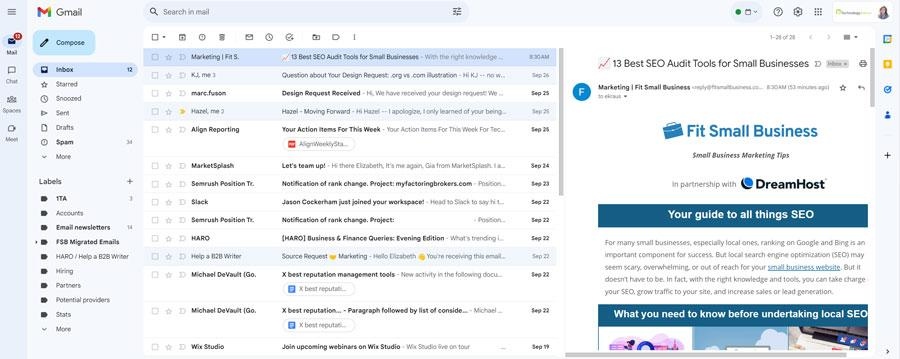
Google Workspace has one of the most recognizable and easy-to-navigate email interfaces.
The one big drawback with Google is its customer support. Because Google is so big, you won’t be able to get one-on-one support if you need it, especially if you’re not an admin. If you need help with anything, you’ll need to search through Google’s massive knowledge base for the answer. While it’s extensive, it’s still not the same as having on-hand guidance, which most other email platforms provide. You can, however, try reaching out to the team via social media.
Our Expert Opinion
You probably already know Google Workspace and may have even used it before. Google is the undisputed leader in the business email space, and it’s earned its stars. It has a secure email platform, productivity tools, and reliable security. If you’re already familiar with Google’s interface—or you want the easiest email platform to navigate—you can’t go wrong with Google Workspace.
Proton Mail: Best for Advanced Email Security
If your email’s security is your number one concern, Proton Mail is the world leader in email security and privacy. All plans, including the free version, include end-to-end encryption, making it ideal for any business that handles sensitive information via email, like patient records or legal contracts, or just any business that wants the best email security possible.
In addition, Proton Mail security complies with GDPR agreements, which is invaluable if you communicate with people in Europe, where it’s a requirement. Another plus is that Proton Mail has substantial storage, especially on the highest Proton Family plan, which offers up to 1TB of email storage and up to six users. Proton Mail even has its own calendar, VPN, and cloud storage (like Google Drive).
The drawback of Proton Mail is none of its plans offer a free domain, which means you’ll need to have your own domain first or purchase one separately from a domain registrar. It also doesn’t have the same productivity tools Google Workspace or Microsoft 365 offers. However, for the value you get, it’s one of the best email providers for small businesses.
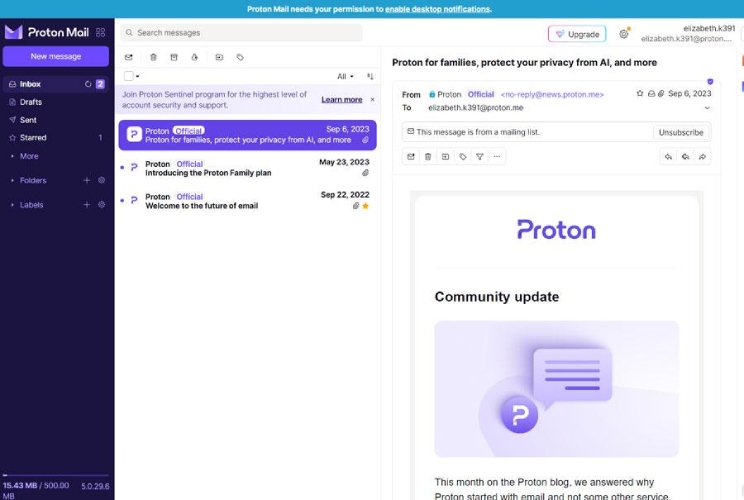
Proton Mail has end-to-end email encryption, even on the free plan. (Source: Proton Mail)
Our Expert Opinion
If your organization needs the most private, secure business email provider on the market, Proton Mail is the best answer. It’s one of the few platforms that ensure both HIPAA- and GDPR-compliant business email services. Plus, there’s a free plan to get started—as long as you already have a domain.
Microsoft 365: Best for Advanced Email & Productivity Tools
If you know Google Workspace, you probably also know its biggest competitor, Microsoft 365. It parallels Google Workspace in many ways, particularly in its productivity tools—however, Microsoft’s are far more advanced. For instance, aside from the documents and spreadsheets from its Microsoft Office suite, it also has planners, appointments, an online collaborative space, and even an online video editing tool.
So, if you’re looking for something a little more advanced than Google Workspace and you’re not a beginner—or you’re already familiar with Microsoft Outlook’s features—Microsoft 365 is one of the best business email providers. Having been around since 1998, it’s also a leader in the industry, and it still has the most advanced email and productivity tools by far. So, if you’re not a total beginner to business email and want more than the basics, it could be your best match.
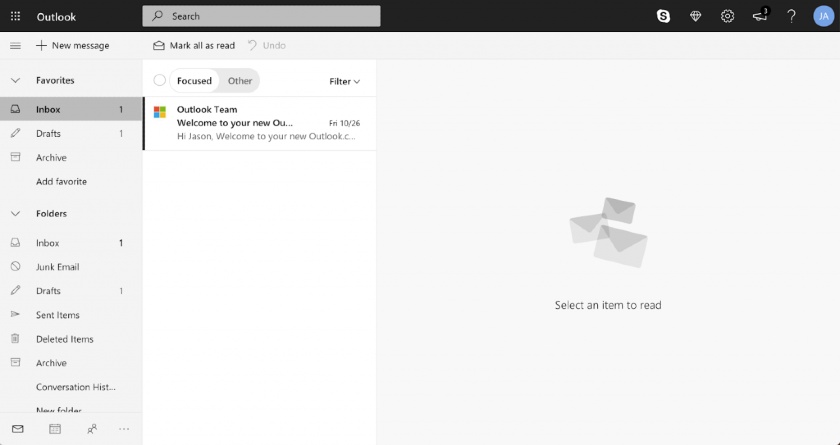
Microsoft Outlook’s email interface can take some time to navigate if you’re unfamiliar with Microsoft.
However, the major downside of Microsoft Outlook is its slightly clunky interface, which can be tricky to navigate if you’re a complete beginner. Because it has so many tools, Microsoft 365 can feel overwhelming and will likely take a learning curve, especially compared with Google Workspace’s sleek, modern interface.
Our Expert Opinion
In the business email space, Google Workspace and Microsoft 365 are always neck-and-neck, mainly because they have so many parallels. However, feature-wise, it’s Microsoft that ultimately wins. It has every productivity tool you could possibly need and then some. As long as you can get around its rather complicated interface (or are already used to it), Microsoft 365 is an email platform you can rely on all around.
IONOS: Best All-in-One Email & Website Platform
If you need an email host with a custom domain, chances are you’ll also need a website builder that can match that domain. It’s far more convenient to have both from one platform. The best business email service for businesses that can do that is IONOS, particularly through its website builder plans, which bundle both websites and business email in one plan.
Its plans are some of the most cost-efficient, with the Plus plan starting at $1/month on a one-year term. Unfortunately, though, all IONOS’ plans are on annual contracts—it doesn’t offer any month-to-month contracts. However, with the Plus plan, you’ll get a business email with 12GB storage, plus access to IONOS’ AI website builder that lets you generate a website with the same domain as your email. It’s especially helpful if you’re a beginner to website building.
In fact, while it’s not as beginner-friendly as Google Workspace (no one can beat Google Workspace in user-friendliness), IONOS is by and large one of the more user-friendly platforms around—it’s used by many small businesses around the world. IONOS also has spam filters and antivirus protection for your emails, so you can rest assured about their security. Finally, you’ll also get a custom domain free for the first year
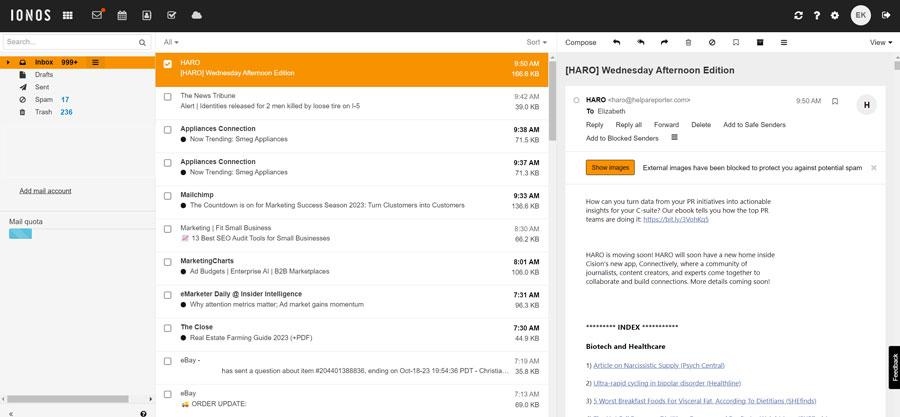
IONOS is one of the most beginner-friendly email (and website) platforms around—it’s our best cost-effective alternative to Google Workspace and Microsoft 365.
Our Expert Opinion
Aside from the two business email giants (Google and Microsoft), IONOS is our best business email recommendation for small businesses or freelancers getting started with professional email. This is especially true if you don’t have a large team yet and don’t need the enterprise features Google Workspace and Microsoft 365 offer. IONOS is also far less costly than those two, and it even has a website builder as an extra treat. If you want a website to go along with your email, IONOS is a platform you can trust.
Hostinger: Best for Agencies & Resellers
Every small business needs a business email address. So if you’re an agency or any type of reseller handling multiple small businesses, you might need an email host that can support a high volume of email addresses and websites on a platform that’s easy to use. The best match for that description is Hostinger.
All Hostinger’s plans let you create up to 100 email addresses (and email aliases) and 100 websites, and its higher plans allow up to 200 and 300 websites. Plans start at just $2.49 a month (on a two-year contract), which is why it’s a good option if you’re looking to resell to small businesses, for instance, as part of a wider package. Hostinger is also an easy-to-navigate platform, even for beginners.
Hostinger also has standalone email plans, although they don’t give as much value as its all-inclusive plans. However, all plans will still come with antivirus and antispam protection. The catch is that Hostinger doesn’t have any built-in productivity tools. What it does have is an AI website builder that can even support ecommerce sites (and is even one of our top-recommended website builders for small businesses).
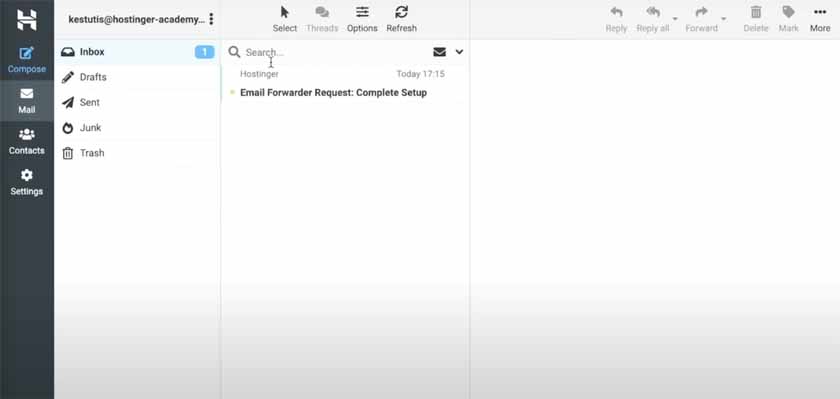
Hostinger offers up to 100 emails on all Website Builder plans. It also has a simple, easy-to-use interface.
Another considerable drawback with Hostinger is all its emails only come with 1GB of storage per inbox, which is much smaller than the standard. It does make up for it, though, in its website storage, which starts at 100GB and goes up to 200GB on higher plans.
Our Expert Opinion
I’ve tested Hostinger many times before, and it’s always been a reliable, easy-to-navigate platform—both for its website builder and email platform. Plus, its plans are some of the most value-packed, especially for its price point. If you don’t need sizable email storage and need a good number of email accounts and websites (but not unlimited) on a platform that’s easy to use, Hostinger fits the bill.
Zoho Mail: Best Free Business Email Platform
If budget constraints are your main concern, look no further than Zoho Mail. It’s one of the best ways to get a 100% free business email address (really!). But the one major caveat is that you’ll need to have your own domain first, as Zoho Mail doesn’t provide custom domains. If you already own a domain, Zoho Mail’s free-forever plan provides up to five email addresses on your domain, along with its online email platform.
Plus, the free-forever plan also comes with 5GB storage per user, with a 25MB attachment limit, which is higher than most others, including Proton Mail. Meanwhile, on higher plans, you get higher storage and attachment limits, as well as Zoho Mail’s team collaboration tools, which include shared calendars and appointment booking—all at no more than $4 a month (on annual billing).
Zoho Mail is also a very beginner-friendly platform with an email interface similar to Gmail or Microsoft Outlook. It also has shared calendars, online word processors and spreadsheets, and meeting software—at a lower cost than those two top providers.
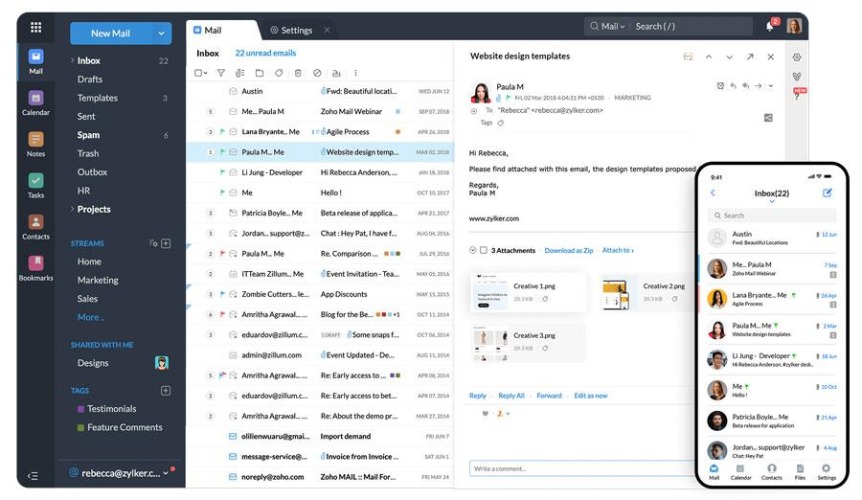
Zoho Mail’s desktop and mobile app interfaces (Source: Zoho Mail)
Our Expert Opinion
Zoho Mail is one of the best email services for businesses on a budget. For less than $5 a month on any plan, you get a professional email address (even on the free plan), sizable attachment limits, plus shared calendars, emails, and folders. You also get tasks, notes, and team collaboration tools. If you’re looking for a low-cost alternative to Google or Microsoft, Zoho Mail is the best answer to your needs.
DreamHost: Best for Unlimited Email Addresses
While all the email providers for businesses on this list can give you a professional email address on a small scale, they can quickly get expensive if you have a large team with dozens of members. In that case, you’ll want a more scalable and cost-effective email host that can support many team members (aka many email addresses). One of the best business email providers that can do that is DreamHost.
While it’s more known as a website host, DreamHost also has all-inclusive plans for both emails and websites, like IONOS, particularly through its Shared Unlimited hosting plan. However, unlike IONOS, its plan supports unlimited email addresses and websites for just $4.95 per month (on annual billing), making it one of the most cost-effective platforms on the market.
Even more, your website won’t just be any website—it’ll be a WordPress website that you won’t need any skill to build because DreamHost uses an AI WordPress website builder. It’s by far the easiest route to get a WordPress website without needing to use the WordPress platform, which can be complicated if you’re unfamiliar with it. You’ll also get a custom domain for your emails and websites that’s free for one year.
DreamHost also uses a web-based email, meaning you can access your emails from any browser. The primary drawback with DreamHost is that all its emails have a strict limit of 25GB per mailbox, which you can’t expand. Also, DreamHost doesn’t have any productivity tools at all, which isn’t helpful if you need to collaborate with your team (for instance, if you work remotely).
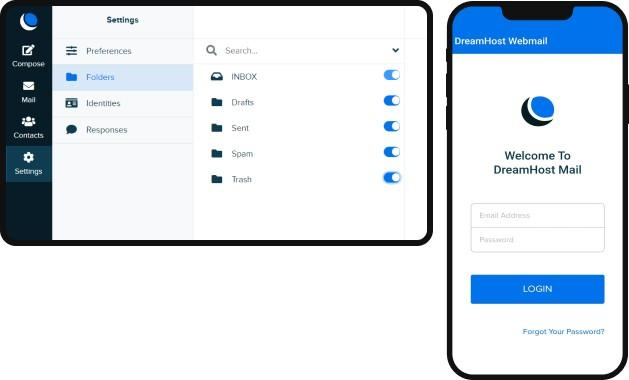
DreamHost’s Shared Unlimited plan provides unlimited emails (and WordPress websites). (Source: DreamHost)
Our Expert Opinion
While DreamHost doesn’t have any productivity or collaboration tools, it’s one of the only business email service providers that provide unlimited emails at its price point. Plus, its biggest standout feature is its ability to build WordPress websites using AI—something not even Google or Microsoft can do. If you have a large team and prioritize websites over documents and spreadsheets, DreamHost is the one for you.
InMotion Hosting: Best for Guaranteed Uptime & a Dedicated IP Address
InMotion Hosting offers just about the highest uptime guarantees available: 99.99%. It also provides zero-downtime migration and transfer services, which is invaluable for ensuring your website is always available whenever customers visit it. Plus, Inmotion Hosting also offers a dedicated IP address on all its plans, which makes your emails more credible and ensures they get delivered properly (aka, they don’t end up in spam folders).
Aside from its uptime and dedicated IP addresses, InMotion can also host websites, so it’s also a good option if you want an all-in-one host for your websites and emails. Inmotion Hosting also has a website builder—although it’s not as intuitive as Hostinger’s and IONOS’s, nor is it AI-powered. Another drawback is that InMotion Hosting’s email storage is very limited: just 1GB on the first plan and 20GB on the highest.
It’s also worth noting that it doesn’t have a standalone email hosting plan—all plans bundle website and email hosting, which isn’t helpful if you’re only looking specifically for a platform for your emails. However, it has the industry standard for uptime guarantees and is the only one offering a dedicated IP address on all its plans so far.
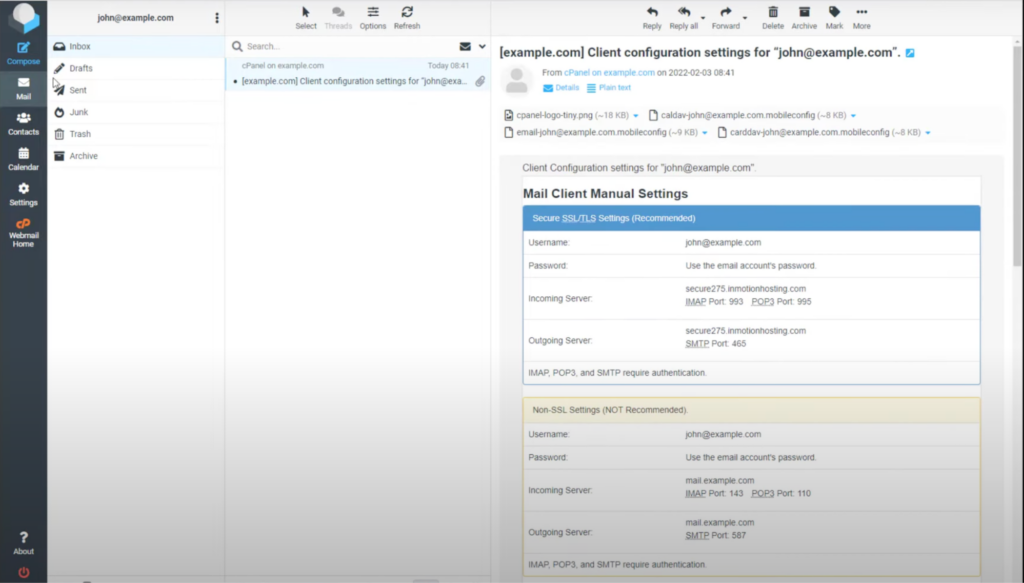
InMotion offers email hosting with faster-than-average data processing. (Source: Inmotion Hosting)
Our Expert Opinion
While InMotion Hosting isn’t a standalone email host, it provides the best guarantee in the industry by far that your website will be accessible anytime and anywhere and your emails will always be delivered to the right inboxes. If accessibility is a major priority for your business communications, InMotion Hosting might have what you need.
ScalaHosting: Best for Daily Email Backups
If having secure copies of your emails is important to your business, you’ll benefit most from an email host that provides daily backups. One of the best email hosting services for this is ScalaHosting. It’s the only one on this list that provides daily email backups—even up to seven daily—and you can restore them anytime from the CPanel. This makes it a good choice if you handle sensitive or important information via email.
On the starting plan, you can create up to 10 email accounts under one domain, which automatically comes with seven daily backups to a remote server. However, the starting cost for this plan is $6.26 per month on a one-year contract (or $4.46 per month on a three-year contract). Unfortunately, ScalaHosting only offers month-to-month contracts on its highest plan.
The highest tier also has the most advanced security features, including real-time malware protection and user controls, as well as a free custom domain. This is another drawback with ScalaHosting—you only get a custom domain on the highest plan. On any other plan, you’ll need to have one already or get one separately.
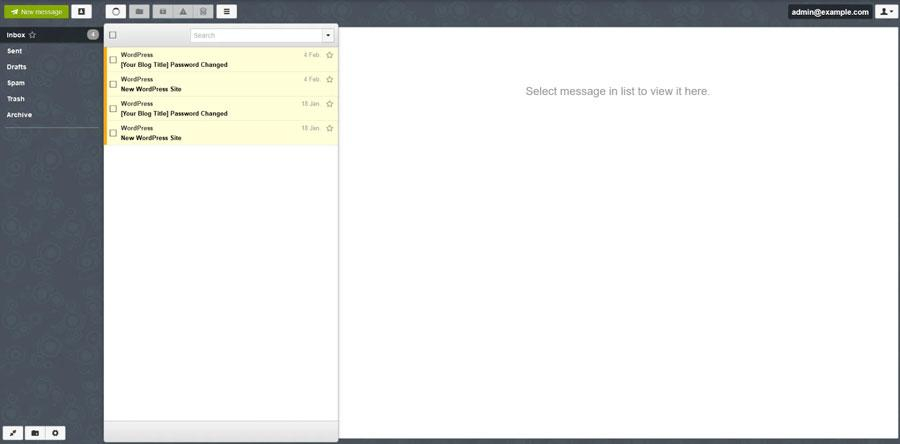
ScalaHosting provides up to seven daily backups of your emails. (Source: ScalaHosting)
Our Expert Opinion
While you’ll need to have your own domain before using the service (unless you choose the highest plan), ScalaHosting is still one of the most secure platforms in terms of email backup and recovery. It’s especially helpful if you handle lots of information via email, like databases and records. Plus, all its plans come with security and advanced antispam.
How We Evaluated the Best Business Email Providers
All businesses need email that can be accessed quickly, securely, and reliably, with enough storage to keep messages from bouncing. However, solopreneurs may only need a single email address, while growing companies need scalable solutions. Because of these, I looked at options that can serve anyone, from sole proprietors to businesses with multiple employees, agencies, and resellers.
25% of Overall Score
Your business email needn’t take up a significant amount of your budget. However, email providers have different pricing plans. Therefore, I looked specifically for platforms that offered both standalone and scalable plans as well as all-in-one cost-saving bundles.
20% of Overall Score
General features speak not only to the essentials that business email users need (like adequate storage, multiuser plans, and data, spam, and virus protection) but also to the overall product value vs cost.
20% of Overall Score
Niche features include built-in AI writers, end-to-end encryption, HIPAA and GDPR compliance, private domain registration, and built-in communication tools for chat or video (and any other software that comes with the plan).
10% of Overall Score
The platforms above were also rated by the quantity and quality of the available self-help resources and the level of customer support to help with setup, troubleshooting, and account management. Platforms with longer customer service hours were also graded higher.
25% of Overall Score
Regardless of how a provider scores on paper, how it works in the real world is a key factor. I personally tested each of these providers and evaluated them by their features, usability, and value for money.
5 Things to Consider When Choosing an Email Host
With dozens of business email platforms available, you’ll need to choose carefully to find the absolute best fit for your business. This includes considering variables like your business’ specific needs and priorities. For example, do you already own a domain and just need an email platform, or do you still need to purchase one? This will significantly narrow down your options. Here are other important things to consider when choosing your business email host.
- Your priorities: Your priorities should always be the number one consideration when choosing the best email host for your business. Do you prioritize security, ease of use, or affordability? Each provider has its own set of features and benefits that may or may not be the best fit for your business.
- Extra features: The best business email providers can also provide features like productivity and team collaboration tools that can help your business substantially. Take note of any other features you may need to run your business.
- Previous reviews: Most email hosting services have customer reviews published on major tech review sites. But sites like G2.com and Trustpilot are also good places to research tech companies and get takes from real customers about which service is best or which to avoid. Taking the time to check customer sentiment and reliability can save you productivity and revenue.
- Scalability: As your business grows, will your email provider accommodate the additional accounts, storage, and features your team will need? What about future plans? For instance, you may not need a website now, but you may in the future, and hosting it on the same provider as your email will be more convenient.
- Cost: No small business’ marketing budget is the same. Aside from evaluating whether your email host fits in your budget, consider whether you’re getting enough features and benefits out of your plan and if your provider’s pricing scheme is sustainable.
Frequently Asked Questions (FAQs)
The overall best email service for businesses is Google Workspace, especially if you’re a beginner. Google Workspace has an easy-to-navigate email platform, cloud storage, reliable security, and its famous productivity tools, including Google Docs, Sheets, Slides, and Meet. However, if you’re looking for more advanced email tools, Microsoft 365 might be a better fit. Meanwhile, if you want an email platform with a website, IONOS is also a good choice.
According to recent studies, the most-used email client in the world by businesses is Apple, with a 54.67% market share as of September 2024.1 However, this figure encompasses everyone with an Apple ID—not necessarily everyone who uses it. Outside Apple, the other most-used email clients are Gmail with a 30.70% market share and Microsoft Outlook with 4.38%.
Microsoft Outlook (aka Microsoft 365) is better than Gmail (Google Workspace) when it comes to advanced features. While Google Workspace has Google Docs, Sheets, and Google Meet, Microsoft has the Microsoft Office suite with many similar tools, plus planners, appointments, Microsoft Loop (an online collaboration space), and Clipchamp (an online video editor). Meanwhile, Gmail is better than Outlook for user-friendliness and cloud storage.
Find out more about how Microsoft 365 stacks up against Google Workspace.
Bottom Line
The right business email provider can make managing a business or organization so much easier. The best email for businesses provides not just a professional email address but also reliable security and ample cloud storage, and some even have tools that allow you to collaborate across teams and maximize your productivity. Any one of the providers above can give you a solid, reliable business email—it all comes down to what your business needs most.
Reference:








